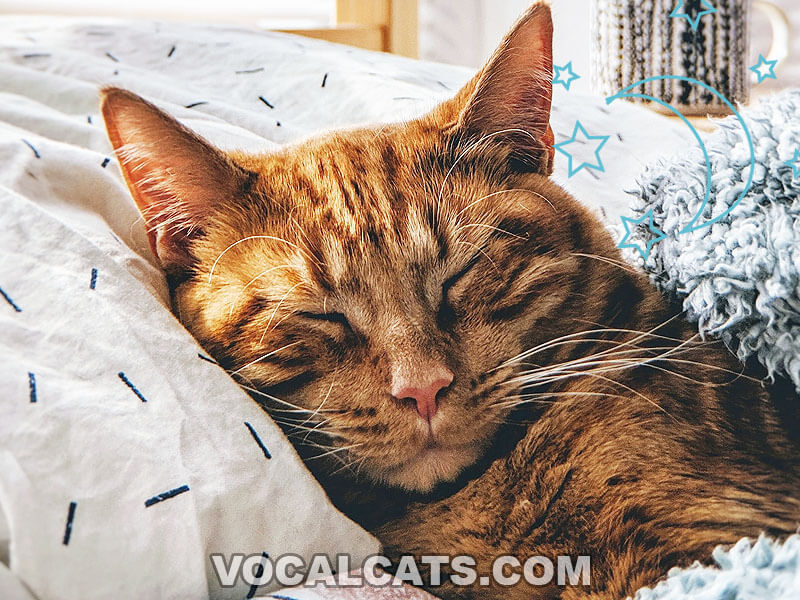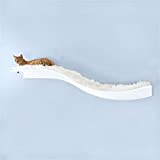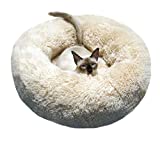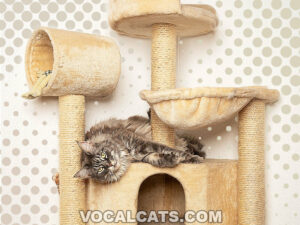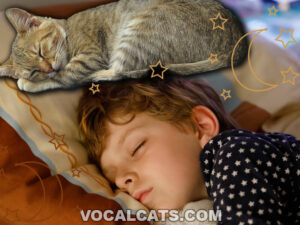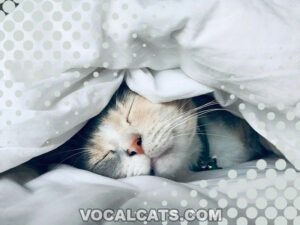Why does my cat sleep on my pillow? Cats love to curl up on your pillow because they love the warmth. It also makes them feel secure and safe when they are close to you. Other reasons may include wanting to be in charge, asserting their dominance, showing their love, or protecting you.
You might be wondering why your feline companions insist on sleeping on your pillow. Is it for comfort? A way to claim their territory? Or maybe they just like the way your pillow smells? There are many reasons why your fuzzy friends might want to sleep on your pillow, and each reason is unique to each individual kitty.
In this article, we’ll take a look at 13 different reasons why cats might choose to sleep on your pillow. From claiming their territory to seeking comfort, there’s a good chance your little fur babies have a good reason for sleeping on your pillow over sleeping under the covers. So the next time you find yourself puzzling over this behavior, remember that your cat has a valid reason for it!
Contents
- Why Has My Cat Started Sleeping On My Pillow?
- Why Do Cats Sleep On Your Pillow?
- Why Does My Cat Sleep On My Pillow When I’m Not Home?
- Should I Let My Cat Sleep On My Pillow?
- 6 Reasons Why You Should Not Let Your Cat Sleep On Your Pillow
- How Do I Stop My Cat From Sleeping On My Pillow?
- 6 Helpful Ways to Stop Cat Sleeping On Pillow
- If My Cat Sleeps On My Pillow, Is It Okay To Wake Him Up?
- Why Does My Cat Sleep Above My Head?
- 7 Problems With Cats Sleeping Above Your Head
- What Does It Mean When Your Cat Sleeps Above Your Head?
- What Does It Mean When Your Cat Sleeps with You?
- 5 Things You Can Do To Help Your Cat Sleep Better
- Why Does My Cat Lick My Pillow?
- So, Why Does My Cat Sleep On My Pillow?
- Related Questions
Why Has My Cat Started Sleeping On My Pillow?
A cat sleeping on pillow is not a foreign concept. There are many reasons for this behavior. If your fluffy companion has suddenly started to sleep on your pillow, it could be due to changes in the environment, stress, anxiety, or even changes in the season.
If you’ve recently moved to a different home, your four-legged friends may be struggling to adjust to the new home and the new environment. As a result, they may want to stay closer to you to feel safe and secure.
Furthermore, if you have another pet in the house, your fuzzy friend may want to assert dominance and feel special by sleeping on your pillow. If your cat is scared of the new dog, she may feel safer and in control by sleeping on your pillow at night.
Below, we’ll discuss the 13 reasons why your cat is suddenly sleeping on your pillow.
Why Do Cats Sleep On Your Pillow?
As you’re heading to bed for a good night sleep, you find your fluffy companion curled up cozily and sleeping on your pillow. As you’re trying to shoo away your fuzzy friend from your pillow, you find yourself saying out loud, “My cat sleeps on my pillow!” and sighed loudly.
This is a common complaint from many cat owners. But there may be a good reason why your little fur baby is sleeping on your pillow.
They may simply want to be near you to protect you as they know you’re heading to bed soon. Or it could be that they want to feel warm and cozy near you or even love the way you smell.
Other reasons include feeling safer either by being closer to you or being higher up from the bed and floor. They may also want to show you their love and affection or it could simply be that they just love to sleep on your pillows!
Let’s discuss each one in more details.
1. To be close to you
Have you ever wondered why your fluffy family member loves to sleep on your pillow? A simple reason could be because she loves you!
Your little fur baby may want to show you love and affection, so she chooses the spot closest to you when you’re relaxing in bed. This way, your kitty can feel connected to you, both physically and mentally.
A purring cat lying close to your head on the pillow means that they are completely happy and content to be with you and wants to show it. Because your head is the only part not under the covers, your fuzzy friend has no choice but to choose that spot.
2. Want to protect and comfort you
Why does your fuzzy family member insist on sleeping on your pillow? There are several reasons, but the most common one is that they want to protect you. Your fur baby knows that you’re a vital part of her life and wants to be close to you as often as possible.
If you’ve been stressed or anxious lately, you will notice your cat picking up on it. When she does pick up on it, she will want to protect and comfort you.
Your kitty cat will want to sleep close to you on your pillow or on your head to make sure you’re feeling safe and comforted. By lying close to your head, she wants to make her presence known and tell you that she sees you and acknowledge how you’re feeling.
Because your furry companions are sleeping on your pillow right above your head, you’re able to reach her and stroke her.
According to Cornell Feline Health Center, simply petting or stroking your cat for at least 10 minutes can help reduce stress and anxiety. This is helpful not only for yourself but for your cat too (if she’s feeling stressed as well).
3. Love the smell and feel of your pillowcase
Did you recently changed your pillowcase and put on a clean fresh one? Cats love the smell of clean and fresh laundry and they love anything that is soft.
So if you have a pillowcase that is made of natural fabrics like linen, flannel, or cotton, your feline companions may be attracted to it not only because it is clean but also because it feels soft.
Adding to the fact that your pillowcase is clean, fresh, and soft, the soft bouncy pillow itself may also attract your feline friends to lie on it. They may feel so comfortable that they may fall asleep on your pillow.
4. Your cat recognize your scent on the pillow
Do you usually smell like vanilla, lavender, or chamomile at night?
If you use a particular scented facial moisturizer or lotion at night and sleep on your side, that scent on your face could transfer on to your pillows.
And as we all know, cats love to cuddle up with their owners and will recognize their owners’ scent.
So, if you work a 9 to 5 job and your fuzzy friends feel alone or stressed, they may lie on your pillow to feel closer to you even though you are not there.
That’s because they could smell their owners’ scent on the pillow and this provides them some level of comfort and solace. Once your kitty cats get comfortable lying on the pillow, they may fall asleep while waiting for you to come back home.
Thus, if you’re heading out to buy groceries or to run an errand and come back home to find your little furballs sleeping on your pillow, this could be the reason why.
Additionally, because our furry friends may associate a particular smell or scent on the pillow with that of their owners, they may want to inhale that scent all night long. For this reason, they may choose your pillow to sleep on.
Furthermore, some people’s hair has an awesome scent, like coconut or rose water (depending on the type of shampoo used). If your feline friends love how your hair smells, they will want to dig their noses into your head and sleep. And as a result, they may lie on your pillow because that’s where your hair is.
5. Like the warmth
Cats are attracted to warmth, comfort, and soft sounds – all of which can be found in a pillow.
The normal body temperature for a cat is 101°F to 102.5°F (38.3°C to 39.2°C), while that of humans is 98.6°F. Your fuzzy friend needs to maintain a constant body temperature or homeostasis. Due to this, she’ll want to cuddle close to you to gain heat and stay warm.
Furthermore, to sleep in a warm place such as on your pillow means your fluffy companion doesn’t have to use up a lot of energy just to stay warm. And that saved energy can instead be used throughout the day, such as for walking, playing around, and jumping.
So, the next time you find your kitty cats snoozing away on your pillow, know that they’re not just being lazy. They’re just trying to save and reserve their energy.
If you want to reclaim your pillow and bed from your feline friends, but still want to keep them snug, a a self-warming cat bed is the perfect solution. This provides your cat with both comfort and their very own cozy spot while also respecting your personal space.
6. Feel safer in a high place
Cats feel safe and secure when they’re higher up from the ground.
In fact, most cat breeds like to be in higher places because of their natural instinct to stay safe, keep an eye on what’s going on around and below them, and to increase their chances of survival. They also feel more comfortable and confident when they can see everything that’s going on around them.
The same primitive and survival instincts occurs when they are sleeping or relaxing. When cats sleeps or relaxes, they like to find a higher place (such as your pillow) with a good vantage point.
This comes from their natural instinct to not only protect themselves, but also to be able to get a good aerial view of what’s around her and spot for any potential threat or danger around them.
Essentially, sleeping or relaxing on your pillow puts them in a prime spot for watching everything that’s going on around them.
If you’re a cat parent looking to deter your fuzzy friends from your pillow, yet wanting to offer them a safe, secure, and elevated spot, consider setting up a 60-inch Lotus Branch Lounging Cat Shelf. This can provide them the high perch they crave and away from the ground.
7. Your cat trust you
Moreover, when your little feline family members sleep on your pillow, it is because they trust you.
When cats are sleeping, they know that they’re in a vulnerable state. Thus, by sleeping on your pillow, they’re letting you know that they are most comfortable near you and trust you fully to protect them from any potential threats. They know you won’t harm or hurt them.
So next time your kitties curl up and sleep on your pillow, take it as a compliment.
8. Jealous or possessive cat
Did you recently get a new cat or kitten and within a few days, you find that your first cat suddenly started to sleep on your pillow?
This is a sign that your first cat is jealous or possessive of you and she wants to show your new cat that she is the important one and that she’s the boss of the house.
That’s because felines tend to develop a matriarchal hierarchy and they’re very selective on who their preferred buddies are. Even indoor cats have both territories and hierarchy.
So since our feline companions live in a hierarchy system, sleeping on your pillow is their way of showing other cats in the house that they’re the one in charge. Also, since they think of themselves as higher up in the hierarchy system, they will choose to sleep on your pillow, which is the highest position that they can lie on to sleep.
With that, your new cat or kitten will then be the submissive one and you may find him or her sleeping near your feet or at the foot of your bed.
READ ALSO: Why Do Cats Sleep At The Foot Of The Bed? 15 Reasons Why!
9. Marking their territory to show they’re in charge
Did you know that cats have scent glands on their paws, flanks, and cheeks? When they’re trying to mark their territories (in this case, the pillow), they will rub their paws, cheeks, or flanks against the pillow.
In this way, they’re claiming the pillow and marking their territory with their personal scent. This lets the other cats in the house know that they’ve claim the highest position and that they’ve been there.
As we can see, cats will find a way to assert their dominance.
Another way that your first cat lets other cats in the house know that she’s in charge is by rubbing her paw or cheeks on you, whether it’s your face or hair.
When you’re lying on your pillow, you may find your first fuzzy companion jump up onto your bed and walk towards your pillow. She will then curl up on your pillow because your face and hair is on the pillow.
She’ll then rub her paw or cheek against your hair or head with her own personal scent from her scent glands to make an impression on other cats that you belong to her. When other cats or kittens in the house try to do the same, they’ll learn to back off.
10. Avoid getting kicked out of bed
If you allow your feline companions to sleep on your bed every night or your feline friends have a habit of sleeping on your bed, then they may want to sleep on your pillow to avoid being kicked out of bed as you toss and turn at night.
Your pillow is the best place for your fluffy companions to sleep because they know they won’t be kicked, touched, or startled when their owners move, toss, or turn at night.
Just like us, our feline friends may get annoyed if they’re suddenly kicked out of bed or startled when their owners toss or turn at night. They simply want a peaceful night’s sleep.
If you’re looking to offer your furry friends a serene and restful night’s sleep, consider placing a plush snuggle cat bed next to your bed.
11. Want to keep an eye on you
As we mentioned above, our fuzzy friends feel safest when they’re closest to their owners. They know their owners are there to protect them from any danger or harm.
However, it is worth noting that our cats have been in the wild for the most part before they were domesticated. They know that during sleep, they are the most vulnerable.
In the wild, cats that trust each other would look out for one another so they apply that same instinctual behavior when they became domesticated.
With that, our feline friends feel the need to keep an eye on their human owners at night since their owners are also vulnerable when they’re sleeping too.
Therefore, you’ll find that your your fuzzy friends like to sleep on your pillow so they can keep an eye on you and make sure you are safe when you’re sleeping.
Keeping an eye on you could also mean that your kitties are sleeping on your pillow because they can detect your warmth and presence and know that you’re there safe and sound. It doesn’t always mean that they open their eyes every time to watch you.
12. Stress
A change of environment can cause your fuzzy friend to feel stress or insecure. In that case, she may take refuge on your pillow to find a sense of security, safety, and to de-stress.
In terms of a change in environment, it could be that you moved to a new house or apartment or that you simply re-arranged the furniture in your home.
Any of these changes can confuse your fluffy friends and throw them for a loop, which can unfortunately cause them stress and anxiety.
13. They just like pillows!
Pillows are soft, warm, and comfortable to sleep on. Your kitties may find it an attractive place to sleep after accidentally stumbling upon it. This may be because the pillows are more comfortable than their usual resting place or bed.
If your cat love soft and warm pillows, try giving them a soft plush round cat bed instead.
Why Does My Cat Sleep On My Pillow When I’m Not Home?
It’s very common for our feline friends to suffer from separation anxiety when you leave them at home all alone.
Cats feel quite attached to their owners and when their owners suddenly leave them alone at home, they may find ways to comfort themselves.
One of these ways is to find an object in your home that has your scent on it. And what better object than your pillow! Therefore, you may find your fuzzy friends nesting or sleeping on your pillow while waiting for you to come back home.
Should I Let My Cat Sleep On My Pillow?
It depends. Your cat sleeping on your pillow indicates that she trusts you, wants to be closer to you, and wants to show you love and affection.
While this bonding is great between the cat and the owner, it’s important to set boundaries. That’s because a cat sleeping on your pillow can become problematic and can even lead to potential health issues.
For starters, your fluffy friend may be infected with fleas and ticks. If the cat fleas are not treated and your kitties are still sleeping on your pillow, the cat fleas can be transferred onto the owner.
WANT MORE INFORMATION? Check out What Do Cat Fleas Look Like To The Human Eye? With Pictures!
Cat owners with cat fleas will often find red, round, and itchy spots on their lower legs.
Other reasons why you should not let your cat sleep on your pillow includes ruining your sleep, triggering your allergies, or even exposing you to litter box debris.
RECOMMENDED: Cat Digging In Litter Box: 10 Reasons Why & What To Do!
Next, we will explain all of these reasons in detail.
6 Reasons Why You Should Not Let Your Cat Sleep On Your Pillow
You might think letting your cat sleep on your pillow increases its affection for you and makes you two bond together. However, there is more harm than good in doing that. Cat owners with allergies and those who find it difficult to stay asleep properly throughout the night may not be able to enjoy cuddling with their cats. Here are 6 reasons you should not let your cat sleep on your pillow.
1. Disrupt Your Sleep
Cats sleep around 15 hours daily; however, their sleep cycles don’t always match ours. If your cat sleeps a lot during the day, it can get active at night and may not let you sleep. This can disrupt your sleep, especially if your cat sleeps on your pillow or with you on your bed.
2. Cause Fungal Infections
Letting your cat sleep on your pillow means you let the parasites your cat may have infect you. These parasites can bite you, causing itchy welts and making your life miserable.
If your cat has intestinal parasites, such as hookworms and roundworms, you can easily get infected if you come into contact with your cat’s feces.
3. Cause Bacterial Infections
Not every cat is free from bacteria or infection. An infected cat sleeping on your pillow increases your risk of getting a bacterial infection. Although it is not harmful to adults, it can be fatal for young children or the elderly because they have weaker immune systems.
An infected cat can transmit a cat-scratch disease called bartonellosis via biting or scratching. This swells up your lymph nodes leading to fatigue, fever, muscle soreness, and other symptoms.
4. Expose You To Litter Box Debris
Although cats clean themselves a lot, it doesn’t mean they are always free from germs or litter box debris. Their litter boxes contain a lot of germs that you shouldn’t come into contact with. Some of it may stick to your cat’s paws which they can bring to your pillow.
The only way to prevent yourself from getting exposed to cat waste or litter is to get a separate sleeping place for your cat.
DON’T MISS: Cat Scratching Litter Box Excessively: 10 Reasons Why & What To Do!
5. Harm Young Children
Cats love to play with children; however, unlike adults, they can’t make a cat stop what it is doing. A cat might accidently scratch your toddler, which can lead to an infection.
Furthermore, it can smother your child accidentally by sitting on their face. To prevent this, keep your cat away from your pillow.
READ NEXT: Do Ragdoll Cats Scratch Furniture?
6. Cause Asthma And Allergies
Asthma and Allergy Foundation of America says it is twice as common to get an allergic reaction to cats than to dogs. Around 30 percent of the population is allergic to cats, so letting them sleep on your pillow can trigger allergic reactions. If you are allergic to your cat, you shouldn’t let them sleep in your room, but in a separate place. Also, get a HEPA filter to keep the air in your room free from particles like dust and pollen.
How Do I Stop My Cat From Sleeping On My Pillow?
You can define a set of rules for your cat to follow. This would require you to train your cat, so it understands that your pillow is a no-go area. You can also make your cat’s bed look appealing, get a heating pad, or play with your cat before bed to encourage it to sleep in its bed. Let’s see how we can use these ways to convince your cat to leave your pillow once and for all.
6 Helpful Ways to Stop Cat Sleeping On Pillow
1. Close your bedroom door
The easiest way to prevent your cat from sleeping on your pillow is to close your bedroom door. Your cat might retaliate by scratching the door and constantly meowing. The key is to ignore its pleas if you want your cat to get used to sleeping in its own bed.
2. Make your cat’s bed look appealing
If your pillow looks more appealing than your cat’s bed, it’s no wonder your cat would want to sleep on your pillow. In this case, try to make your cat’s bed look attractive, comfortable, and cozy while making your own bed look dull and unattractive. Additionally, you can spray citrus on your pillow to drive your cat away from it.
3. Play with your cat before going to sleep
If a cat is exhausted before bedtime, it will fall asleep anywhere. Also, if you spend time with your cat during the day, it won’t miss you much at night and won’t insist on sleeping on your pillow. Play with your kitty and spend quality time with it so it drains the extra energy out of it so it can sleep soundly in its own bed.
4. Get a heating pad for your cat
Usually, cats sleep on your pillow to stay warm. You can get them a heating pad for their own sleeping space to prevent them from using your pillow as one. However, make sure that the heating pad isn’t too warm that it burns your cat.
5. Be firm
Your cat will never leave your pillow if you give in to its pleas and meows. You must teach them to listen to you when you say no. So, whenever your cat jumps onto your pillow, remove it and tell it firmly to stay away from it.
6. Get a friend for your kitty
You can get another kitten for your cat to play with if nothing else works. This can be a good distraction for your cat and help with its separation anxiety.
If My Cat Sleeps On My Pillow, Is It Okay To Wake Him Up?
You shouldn’t wake up a sleeping cat, especially kittens, because they can get cranky. Also, kittens need a lot of sleep because it is important for their growth. However, if you need to wake up a kitten or a cat, try to be gentle and slow, so they don’t get startled. If your cat is stretching or yawning during sleep, it means they aren’t in deep sleep or REM, so it is okay to wake them up then.
Why Does My Cat Sleep Above My Head?
“My cat sleeps above my head” is a common complaint among many cat owners. Although, waking up to find your cat sleeping above your head can make you feel warm and fuzzy inside. However, it can also make you wonder why do cats sleep above your head. There can be many reasons for this, and we will discuss the top three here.
1. They want to stay warm
Cats love to snuggle in warm places, such as fresh laundry, on your couch, or even on your laptop. But “My cat sleeps on my pillow above my head,” you complain. This is because your head emits a lot of heat, and it is like a natural heating pad for your cat. So, your cat sleeps above head on pillow to stay warm and cozy.
2. They are distressed
Sometimes, my cat sleeps on pillow above my head when it is scared, distressed, or anxious. It is not hard to find out the source of this. Usually, it’s because my cat has been startled, is sick, or there has been a change of places.
3. They like the smell of your hair and scalp
My cat likes to sleep above my head when I use a fruity or coconut scent shampoo. If you use a shampoo that has a great smell, you’ll find your cat snuggling close to your head at night.
7 Problems With Cats Sleeping Above Your Head
We talked about why cats shouldn’t sleep on your pillows and discussed several ways you can break this habit. Here we’ll discuss seven further problems you can encounter as a consequence of your cat sleeping above your head.
- Cats are nocturnal creatures and don’t spend the entire night asleep. This means they wake up at intervals during the night and would want to romp about before falling asleep again. This can disrupt your sleep if your cat sleeps just above your head.
- This is especially annoying for light sleepers because cats getting active during nighttime can cause their owners to wake up with the slightest movement.
- A cat sleeping above your head means your pillow can have a lot of cat hair. People who suffer from allergies shouldn’t let their cats sleep above their heads. Otherwise, the cat’s hair would trigger their allergies all night long.
- If your cat loves to be outdoors, it can have dirty paws and fur, especially if you don’t clean it regularly. This can ruin your bedsheets and pillows and can be hectic for you to clean every day.
- A cat infested with fleas, parasites, or insects shouldn’t be asleep on your pillow. Such cats need to be cleaned before letting them get anywhere near your bed because they can infect you too.
- Sleeping above your head means a cat has access to your face. During the night, it can get comfortable enough to lie down on your face blocking your mouth and nose. Shutting down your airways means you won’t be able to breathe while sleeping, which is very dangerous.
- If your cat has only started sleeping above your head recently, it can be because it is distressed or anxious and needs to be closer to you to feel safe. You should find out why they are stressed and remove that source so your cat can return to its normal sleeping routine again.
What Does It Mean When Your Cat Sleeps Above Your Head?
It means your cat either loves you a lot and wants to display affection by snuggling close to your head, or it wants to stay warm, and your head acts as a heater for it.
What Does It Mean When Your Cat Sleeps with You?
Your cat sleeps with you to show affection or feel a sense of companionship. It does this a lot if you spend much time out of the house or don’t give your cat much-needed quality time. Cats are playful creatures and love to interact with their human parents. Sleeping is one way to feel that companionship.
5 Things You Can Do To Help Your Cat Sleep Better
There are many reasons why your cat isn’t getting a proper night’s sleep. These range from stress, cold, lack of security, or feeling scared. To ensure that your cat sleeps peacefully at night, you can try out these 5 things:
1. Give Them a Small Meal
Your cat will wake up at night if it goes to bed hungry. Give it a small amount of cat food or boiled chicken before it goes to sleep, so it feels full throughout the night.
2. Get Them Moving Before Bed
Eating without play can lead to feline obesity, which can cause arthritis in cats as they age. This is why a laser pointer session or letting your cat play with a ball is a great way to get your cat moving to prevent obesity. It also tires your cat out and helps it sleep better at night.
3. Keep Their Sleeping Area Warm
Cats can find it hard to fall or stay asleep if their sleeping area is cold. To prevent this, either move your cat’s bed to a warmer room or use a heating pad on their bed. However, don’t go overboard with the heating pad. Use it on its slowest setting and place it on your cat’s bed for 20 to 30 minutes before bedtime.
4. Use a Nightlight
A nightlight will help your cat easily find the water bowl or litter box at night, so they won’t have to bump through obstacles to get to them. A nightlight also keeps your cat from freaking out in the dark or feeling disoriented.
READ ALSO: Do Ragdoll Cats Like Water?
5. Their Sleeping Place Should Be Quiet
Cats are always alert to any external noise or movement and can wake up instantly. To ensure they get a peaceful night’s sleep, set up their sleeping area away from a noisy environment that isn’t shared with other people or pets.
Why Does My Cat Lick My Pillow?
Your cat might like the texture of your pillow and love how it feels. Others might lick your pillow if it has any leftover food on it. Some cats lick away the hair that falls onto the pillow when grooming themselves. Additionally, cats would lick your pillow to mark their territory with their scent.
So, Why Does My Cat Sleep On My Pillow?
A cat sleeping on your pillow is pretty normal. Maybe your cat is trying to tell you that it needs more love and attention or that it is the boss of the house. Or maybe your cat just likes the smell of your shampoo.
No matter the reason, it’s clear that cats like to snuggle up on pillows – and there’s nothing wrong with that! Let your cat sleep on your pillow if you’re okay with it. Make sure to give it plenty of attention and love, too.
Related Questions
There are more cons than pros to your cat sleeping on your pillow. Although it is a bonding moment for you and your cat, it can create many problems for you.
It can be because your cat wants to stay warm, show affection, or feel secure.
Your husband might not be as close to your cat as you are. Cats require attention and quality time with their human parents; if that is missing, they won’t feel as close to you.
It means your cat feels safe, secure, and completely at ease in your company, and sleeping next to your head allows it to show affection towards you.
DISCLAIMER: THIS WEBSITE DOES NOT PROVIDE MEDICAL ADVICE
The information, including but not limited to, text, graphics, images and other material contained on this website are for informational purposes only. No material on this site is intended to be a substitute for professional veterinary advice, diagnosis, or treatment. Always seek the advice of your veterinarian or other qualified health care provider with any questions you may have regarding a medical condition.
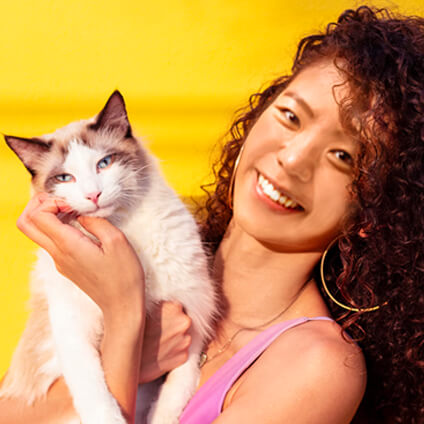
With over five years of specialized experience as an animal writer, my expertise lies in cat nutrition, health, behavior, grooming, and training. I am dedicated to delivering helpful and informative content that caters to the well-being of our feline friends. My primary goal is to empower pet owners with knowledge and ensure our feline companions thrive in health and happiness. In my free time, I love volunteering at local cat rescue centers.
